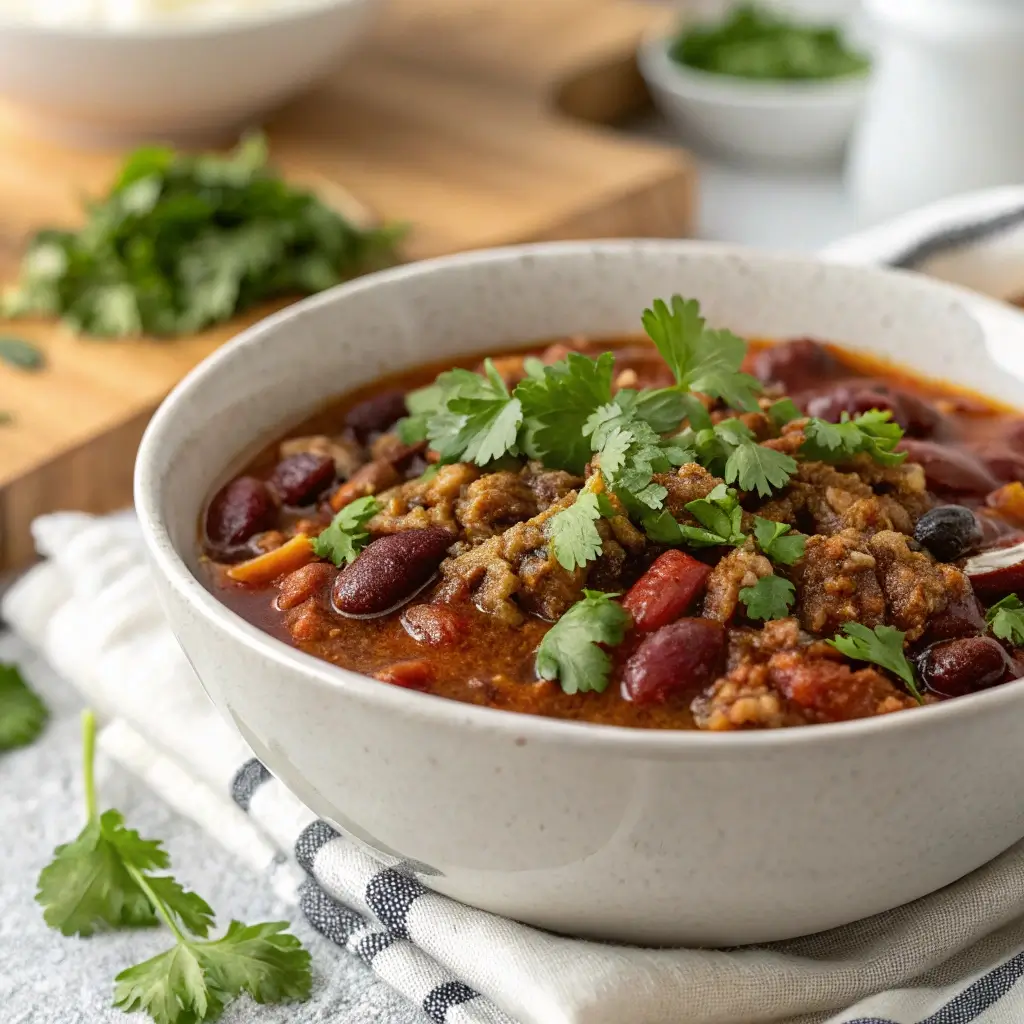Table of Contents
- 1 What Makes This Chili “Healthy”
- 2 Ingredients (Serves 6)
- 3 Step‑by‑Step Instructions
- 4 Tips to Keep the Chili Healthy and Flavorful
- 5 Variations & Flavor Twists
- 6 What to Serve with Healthy Chili
- 7 Storage & Reheating
- 8 Nutritional Estimate (Per Serving, Approximate)
- 9 Frequently Asked Questions
- 10 Final Thoughts
When you hear “chili,” you may imagine rich, heavy, calorie-dense stews. But it doesn’t have to be that way. You can enjoy a bowl of hearty, soul‑warming chili without derailing your nutrition goals. This healthy chili recipes guide gives you a low‑calorie, flavor‑packed chili you’ll want to make again and again.
Using lean meats, plenty of vegetables, beans (for fiber and protein), and bold spices, this chili keeps calories in check while delivering depth, warmth, and satisfaction. Plus it’s ideal for meal prep, weeknight dinners, or cozy nights when you want comfort with a lighter touch.
In this article you’ll find: a recipe you can customize, step‑by‑step instructions, tips for keeping things healthy, variations, FAQs, suggested sides, and storage ideas.
What Makes This Chili “Healthy”
Here are the principles behind keeping chili lower in calories and more wholesome:
Use lean protein (turkey, chicken, or lean beef) or skip meat entirely.
Load up on nonstarchy vegetables (bell peppers, zucchini, carrots) to add bulk and micronutrients without lots of calories.
Include beans for fiber and plant protein; they help you feel full longer.
Use tomatoes and broth rather than heavy creams or excessive oil.
Limit added fats and choose healthy oils (olive, avocado) sparingly.
Season robustly with spices and herbs instead of relying on fat or sugar for flavor.
Adjust portion and topping choices to keep the overall calorie count moderate.
Ingredients (Serves 6)
Use this template and adjust as you like. The nutrition estimate will depend on the exact brands and quantities you choose.
| Ingredient | Amount | Purpose / Notes |
|---|---|---|
| Olive oil or avocado oil | 1 Tbsp | For sautéing |
| Onion, diced | 1 medium | Adds aromatic base |
| Bell pepper, diced | 1 large | Adds sweetness, color, bulk |
| Carrot, diced small | 1 large | Adds texture and nutrient boost |
| Zucchini or yellow squash, diced | 1 medium | Optional, adds bulk with minimal cal |
| Garlic, minced | 3 cloves | Flavor depth |
| Lean ground turkey or chicken | 1.5 lb (≈ 680 g) | Use 93/7 or similar for lower fat |
| Canned diced tomatoes (no salt or low salt) | 2 cans (14–15 oz each) | Provides tomato base |
| Tomato sauce (no added sugar) | 1 can (8–15 oz) | Smooth tomato component |
| Beans (black, kidney, pinto), drained & rinsed | ~2 cups | Protein + fiber |
| Low-sodium vegetable or chicken broth | 1 to 1¼ cups | Adjust to desired consistency |
| Chili powder | 1½ Tbsp | You can adjust up or down |
| Ground cumin | 1 tsp | Warm earthiness |
| Smoked paprika | ½ tsp | Optional for depth |
| Oregano (dried) | 1 tsp | Herbal accent |
| Cayenne pepper or red pepper flakes | To taste (optional) | For heat if desired |
| Salt & black pepper | To taste | Add gradually and taste at the end |
Optional Healthy Toppings (use sparingly to keep calories in check):
Chopped fresh cilantro
Sliced green onion or red onion
Diced avocado (small amount)
Low-fat Greek yogurt or light sour cream
Shredded low-fat cheese
Lime wedges
Fresh jalapeño slices
Step‑by‑Step Instructions
1. Prepare Your Ingredients
Dice all vegetables, rinse and drain beans, open tomato cans, and have your spices ready. This “mise en place” helps the cooking flow smoothly.
2. Sauté Aromatics and Veggies
Heat the tablespoon of oil in a large pot or Dutch oven over medium heat.
Add the diced onion, bell pepper, and carrot (and squash if using). Sauté for about 5–6 minutes, stirring occasionally, until vegetables begin to soften and the onion is translucent.
Add the garlic and sauté another 30 seconds until fragrant.
3. Brown the Lean Protein
Push the veggies to the side and add the ground turkey or chicken. Break it up with a spatula and cook until no longer pink—about 5–7 minutes.
If there is any excess fat, you can drain it (especially if using a higher-fat meat) to reduce calories.
4. Add Spices & Tomato Base
Sprinkle in chili powder, cumin, smoked paprika (if using), oregano, and a pinch of cayenne or red pepper flakes (if desired). Stir well so that the spices coat the meat and vegetables—this “toasts” the spices and deepens their flavor.
Stir in the tomato sauce and diced tomatoes (with their juices). Mix thoroughly to combine.
5. Add Beans and Broth
Stir in the rinsed beans. Add about 1 cup of the broth and stir. If the chili looks too thick, add the remaining broth. You want a consistency that’s saucy but not soupy. The chili will thicken slightly as it simmers.
6. Simmer & Develop Flavor
Bring the chili to a gentle boil, then reduce heat to low. Cover partially with lid and simmer for 25–30 minutes, stirring occasionally. Let flavors meld, and vegetables soften further.
If the chili becomes too thick, add a splash more broth or water. If too thin, simmer uncovered a bit more to reduce.
7. Final Adjustments & Serve
Taste the chili and adjust salt, pepper, or extra spice as needed.
Ladle into bowls, and offer toppings for customizing. Remember, small amounts of toppings go a long way in flavor, so portion them mindfully.
Tips to Keep the Chili Healthy and Flavorful
Use lean meat or skip meat entirely: Ground turkey, chicken, or even plant-based crumbles can reduce fat significantly.
Load up vegetables: Carrots, zucchini, spinach, bell peppers—all add bulk and nutrients without many calories.
Rinse canned beans well: This reduces extra sodium and yields cleaner taste.
Go for low- or no-sodium canned goods: Tomatoes, sauce, and broth varieties make a difference.
Minimize added oil: Use just enough to sauté. You can also use a nonstick pot to reduce oil needs.
Spice boldly: Good seasoning makes a low-calorie dish feel rich and satisfying—don’t skimp on herbs and chili powder.
Mind topping portions: Toppings like cheese, avocado, and sour cream can add calories—offer them sparingly or in healthier versions.
Batch cook and portion: Helps you control serving size and avoid overeating.
Variations & Flavor Twists
Vegetarian / Vegan Healthy Chili: Omit the meat and add extra beans, lentils, or tofu crumbles. Use vegetable broth.
White Chicken Chili Version: Use shredded chicken, white beans, green chilis, and a lighter broth base.
Pumpkin or Sweet Potato Chili: Add pumpkin puree or diced sweet potato for extra texture, fiber, and fall flavor.
Mexican‑Style Healthy Chili: Stir in corn, black beans, and a squeeze of lime at the end for brightness.
Spicy Kick Variation: Add chopped jalapeños, chipotle chili powder, or extra cayenne to turn up the heat.
Slow Cooker or Instant Pot: Brown meat and sauté veggies first (if possible), then transfer to slow cooker (6–7 hrs low) or pressure cook 10–12 minutes, followed by a quick release and thickness adjustment.
What to Serve with Healthy Chili
To make a satisfying meal while keeping things light:
Brown rice, quinoa, or cauliflower rice: Adds healthy carbs/fiber without going heavy.
Whole-grain or gluten-free tortillas / tortilla chips: Offer a crunchy side.
Simple green salad: Lettuce, cucumber, tomato, with light vinaigrette to balance the richness.
Roasted vegetables: Such as Brussels sprouts, broccoli, or sweet potatoes (in moderation).
Warm whole grain bread or cornbread (light version): Use a small piece or serve on the side.
Fresh lime wedges: A squeeze adds brightness without calories.
Storage & Reheating
Refrigerator: Let chili cool, then store in airtight containers for up to 4 days.
Freezer: Portion into freezer-safe containers or bags; keep for up to 3 months.
Reheat: Warm gently on stovetop over medium-low, stirring and adding a splash of water or broth if it thickens too much. The flavors often deepen after resting overnight.
Nutritional Estimate (Per Serving, Approximate)
Depending on your specific ingredient choices and portion size, here’s a ballpark:
Calories: ~ 300–380
Protein: 22–28 g
Carbohydrates: 30–35 g
Fat: 8–12 g
Fiber: 8–10 g
Sugar: 4–6 g (from vegetables and tomatoes)
Use a nutrition app with your exact ingredients to get a precise count if you’re tracking closely.
Frequently Asked Questions
Is chili inherently high in calories?
Not necessarily. It depends on the ingredients. Fatty meat, lots of oil, heavy toppings, and rich additions can drive up calories—but by using lean protein and vegetables, you can make chili light and satisfying.
Can I skip the meat entirely?
Yes. Many healthy chilis are fully vegetarian or vegan. Use beans, lentils, mushrooms, or meat substitutes for texture.
Will the chili be bland without fat or cream?
No—spices, herbs, and layering flavors (onion, garlic, bell pepper, tomato, broth) ensure richness and depth. Also, proper simmering concentrates flavor.
How do I prevent chili from becoming too thick or too thin?
Watch the liquid. Add broth or water if too thick; simmer uncovered or mash beans if too thin.
Can I make this in advance?
Absolutely. Chili tends to taste better the next day. Make it ahead, refrigerate, then reheat before serving.
How many net carbs does this have?
Between 20–30 g net carbs in many versions (depending on bean type, vegetable mix, and portion size). Adjust veggies or beans downward for lower-carb version.
Is this chili gluten-free?
Yes, as long as your broth, canned goods, and toppings are gluten-free. Always check labels.
Final Thoughts
“Healthy” and “comfort food” don’t have to be mutually exclusive. This low‑calorie chili proves it: big flavor, cozy textures, and satisfying warmth without the calorie overload. Whether you make it as a weeknight staple, meal prep, or a weekend pot for sharing, this chili is versatile, nutritious, and crowd-pleasing.
Tweak it to your taste—add more vegetables, switch proteins, or turn up the spice—and enjoy a nourishing bowl that feels like home.





